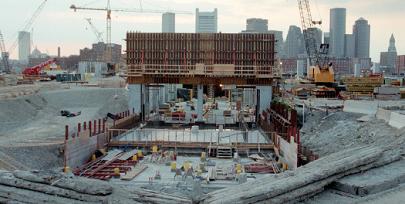Building at home and abroad
Stephen M. Walt

And no, I'm not suggesting a return to isolationism, a retreat to "Fortress America" or any of the other labels that hawks use to try to discredit those who want a more restrained foreign policy. [...] Americans have come to believe that spending government revenues on U.S. citizens here at home is usually a bad thing and should be viewed with suspicion, but spending billions on vast social engineering projects overseas is the hallmark of patriotism and should never be questioned.
I was struck by Louis Uchitelle's article in the Sunday NY Times on the dearth of big public works projects here in the United States. "For the first time in memory, the nation has no outsize public works project under way," he says, and then reports that:
Some economists argue that the continual construction of new megaprojects adds a quarter of a percentage point or more, on average, to the gross domestic product over the long term. Again, cause and effect aren't clear, but the strongest periods of economic growth in America have generally coincided with big outlays for new public works and the transformations they bring once completed."
One might add that we aren't spending enough to maintain our existing public infrastructure, and state and local governments across the country are facing deep budget deficits (and in some cases, a very real risk of bankruptcy).
But it's not as though the United States hasn't started some big public works projects over the past decade or so; it just hasn't been doing them here at home. We've spent billions constructing military bases in Iraq and Afghanistan, for example, and another billion or more on a giant embassy in Baghdad and another one in Pakistan. Needless to say, those "public works" projects are a drain on the U.S. economy rather than a source of additional productivity.
As I've said before, Americans have come to believe that spending government revenues on U.S. citizens here at home is usually a bad thing and should be viewed with suspicion, but spending billions on vast social engineering projects overseas is the hallmark of patriotism and should never be questioned. This position makes no sense, but it is hard to think of a prominent U.S. leader who is making an explicit case for doing somewhat less abroad so that we can afford to build a better future here at home. Debates about foreign policy, grand strategy, and military engagement -- including the current debate over Obama's decision to add another 30,000-plus troops in Afghanistan -- tend to occur in isolation from a discussion of other priorities, as if there were no tradeoffs between what we do for others and what we are able to do for Americans here at home.
And no, I'm not suggesting a return to isolationism, a retreat to "Fortress America" or any of the other labels that hawks use to try to discredit those who want a more restrained foreign policy. Rather, I'm suggesting that national security spending should not be considered sacrosanct and that a nation's leaders can hurt the country just as easily by under-investing at home as by neglecting its defenses. And given that we currently spend more on national security than the rest of the world put together, have several thousand nuclear weapons, face no great power rivals, and don't have any serious enemies nearby, it's kind of hard to argue that we're "neglecting" our defenses. We are using them unwisely (see under: Iraq, Afghanistan) and Obama is about to make his own contribution to this bipartisan blunder, but we're not exactly scrimping.
__________________________________________________________________________________
Source: http://walt.foreignpolicy.com/posts/2009/12/01/building_at_home_and_abroad
























